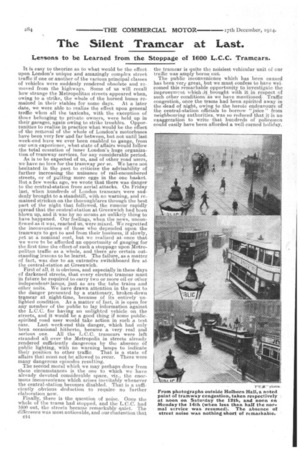The Silent Tramcar at Last.
Page 4

If you've noticed an error in this article please click here to report it so we can fix it.
Lessons to be Learned from the Stoppage of 1600 L.C.C. Tramcars.
It is easy totheorize as to what would be the effect upon London's unique and amazingly complex street traffic if one or another of the various principal classes of vehicles were suddenly rendered obsolete and removed from the highways. Some of us will recall how strange -the Metropolitan streets appeared when, owing to a strike, the whole of the horsed buses remained in their stables for some days. At a later date, we were able to realize the effect upon general traffic when all the taxicabs, with the exception of thosebelonging to private owners, were held up in their garages, again owing to strike troubles. Opportunities to realize in practice what would be the effect of the removal of the whole of London's motorbuses have been very few and far between, but not until last week-end have we ever been enabled to gauge, From our ov:n experience, what state of affairs would follow the total cessation of inner London's huge organization of tramway services, for any considerable period. As is to be expected of us, and of other road users, we haveno love for the tramway per se. We have not hesitated in the past to criticize the advisability of further increasing the nuisance of rail-encumbered streets, or of putting more eggs in the one basket. But a few weeks ago, we wrote that there was danger to the central-station from aerial attacks. On Friday last, when hundreds of London tramcars were suddenly brought to a standstill, with no warning, and remained stricken -on the thoroughfares through the best part of the night that followed, the rumour rapidly spread that the central-station at Greenwich had been blown up, and it was by no means an unlikely thing to have happened. Our feelings, when the news, unconfirmed as it was, reached us, were mixed. We regretted the inconvenience of those who depended upon the tramways to get to and from their business, if slowly, yet at a. nominal cost, but we realized at once that we were to be afforded an opportunity of gauging for the first time the effect of such a stoppage upon Metropolitan traffic as a whole, and there are certain outstanding lessons to be learnt. The failure, as a matter of fact, was due to an extensive switchboard fire at the central-station at Greenwich.
First of all, it is obvious, and especially in these days of darkened streets, that every electric tramcar must in future be required to carry two or more oil or other independenta lamps, just as are the tube trains and other units. We have drawn attention in the past to the danger presented by a stationary, broken-down. tramcar at night-time, because of its entirely unlighted condition. As a matter of, fact, it is open for any member of the public to lay information against the L.C.C. for having a-n unlighted vehicle on the streets, and it would be a good thing if some publicspirited road user would takeaction in such a test ease. Last week-end this danger, which had only been occasional hitherto, became a very real and
serious one. All the L.C.C. tramcars were left stranded all over the Metropolis in streets already rendered sufficiently dangerous by the absence -of public lighting, with no warning lamps to indicate
their position to other traffic. That is a state of affairs that must not be -allowed to recur. There were many dangerous episodes resulting. The second moral which we may perhaps draw from these circumstances is the one to which we have already devoted considerable space, viz., the enorm-ons inconvenience which arises inevitably whenever the central-station becomes disabled. That is a sufficiently obvious deduction to require no further elaboration now.
Finally, there is the question of noise. Once the whole of the trams had stopped, and the L.C.C". had 1600 out, the streets became remarkably quiet. The digerenee was most noticeable, and -our clantention that 014 the tramcar is quite the noisiest vehicular unit of our traffic was amply borne out
The public inconvenience which has been caused has been very great, but we must confess to have wel, corned this remarkable opportunity to investigate the improvement which it brought with it in respect of such other conditions as we have mentioned. Traffic congestion' once the trams had been spirited away in the dead -of night, owin5 to the heroic endeavours of the central-station officials to borrow"juice " from neighbouring authorities, was so reduced that it is no exaggeration to write that hundreds of policemen could easily have been afforded a well-earned holiday.




















